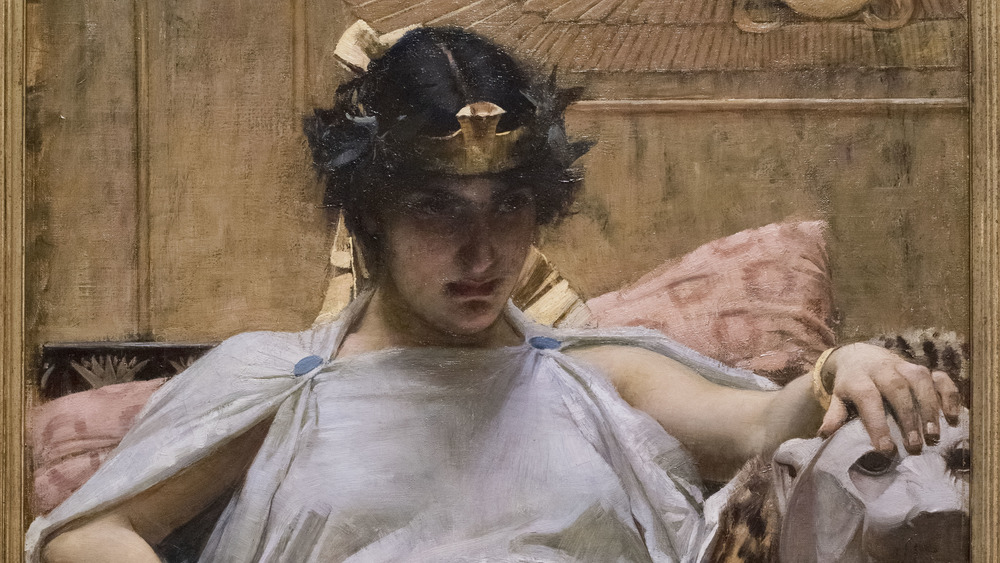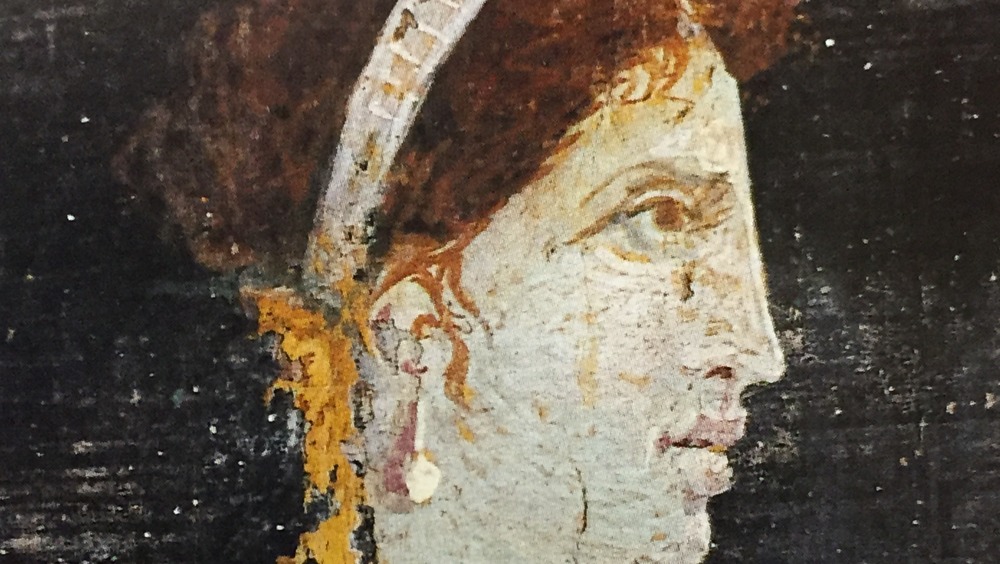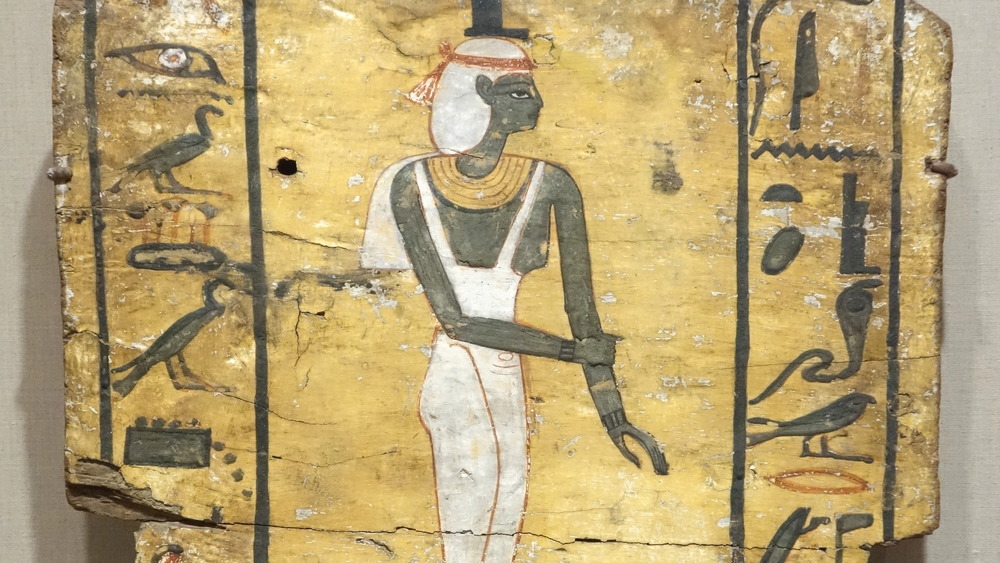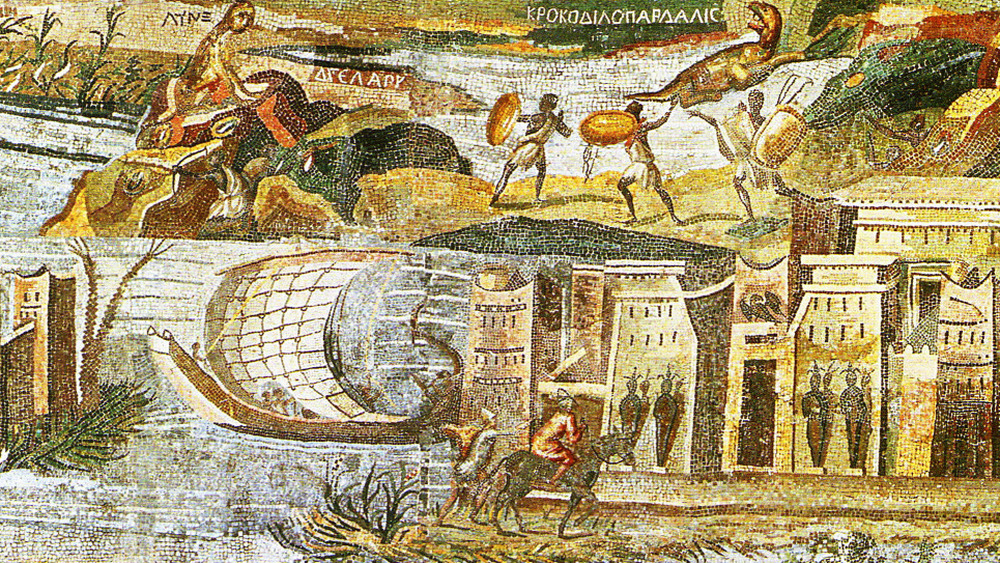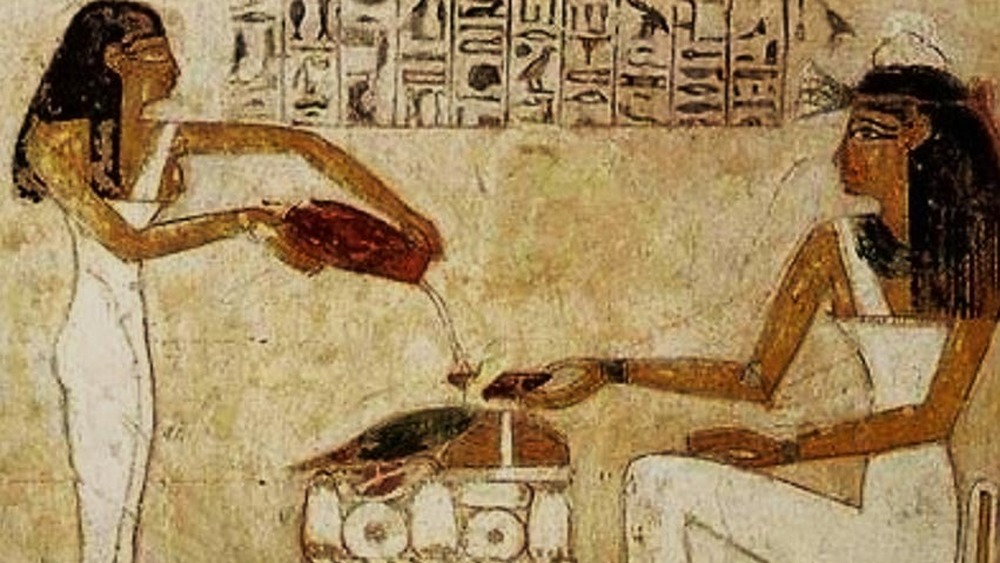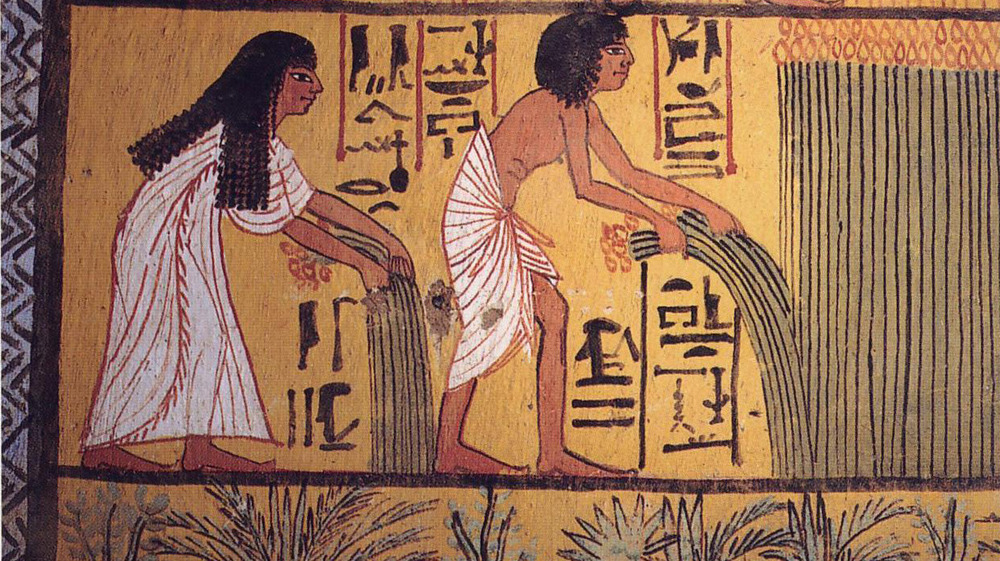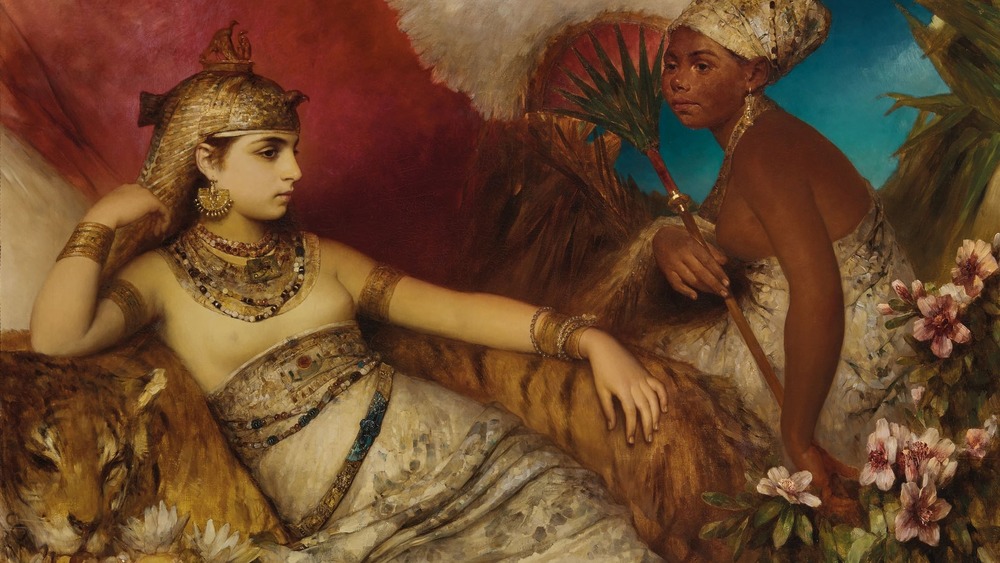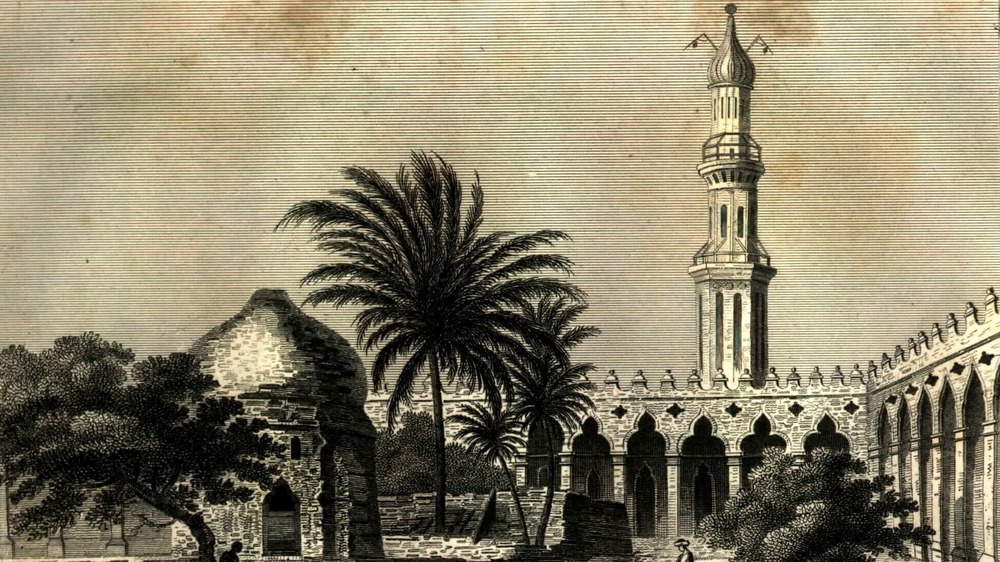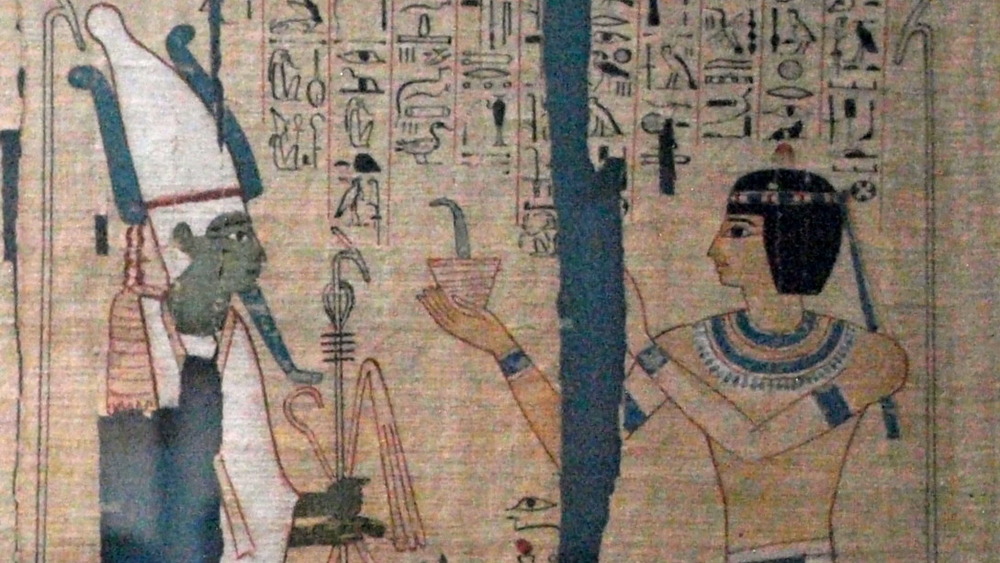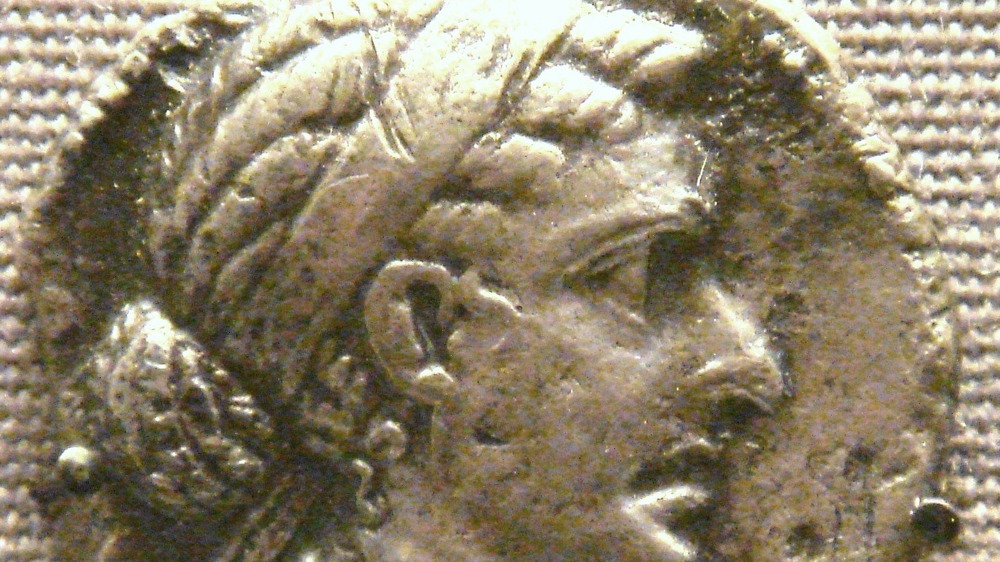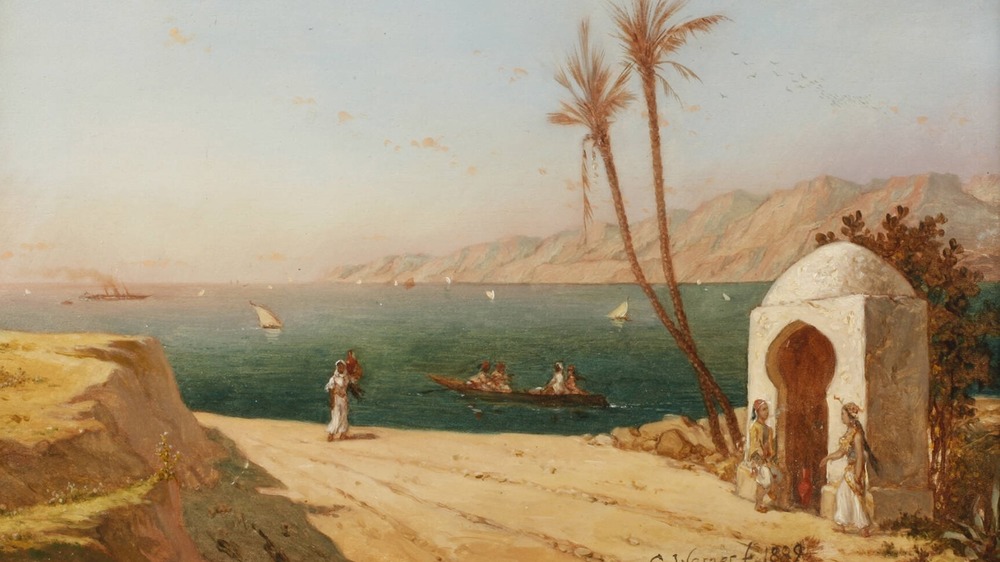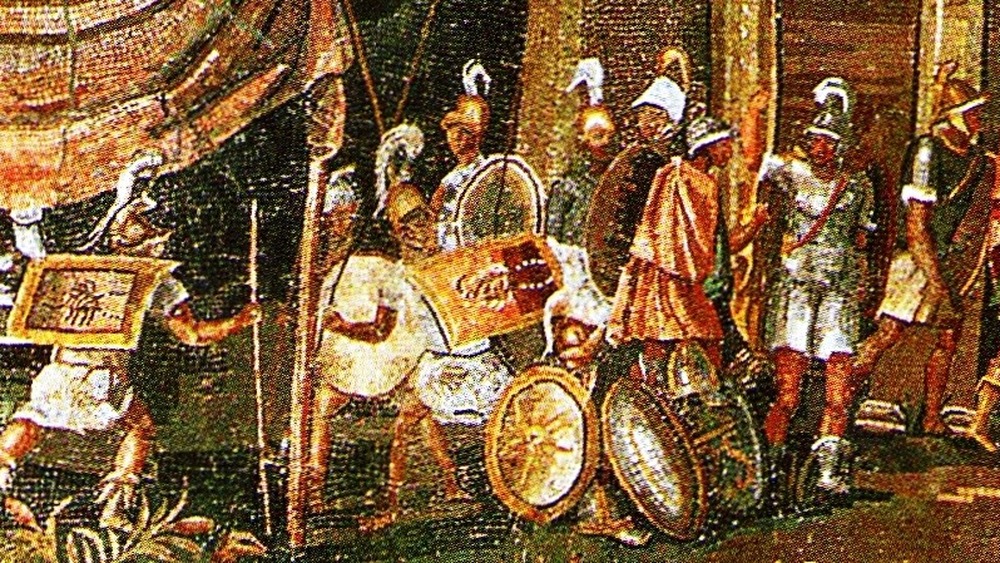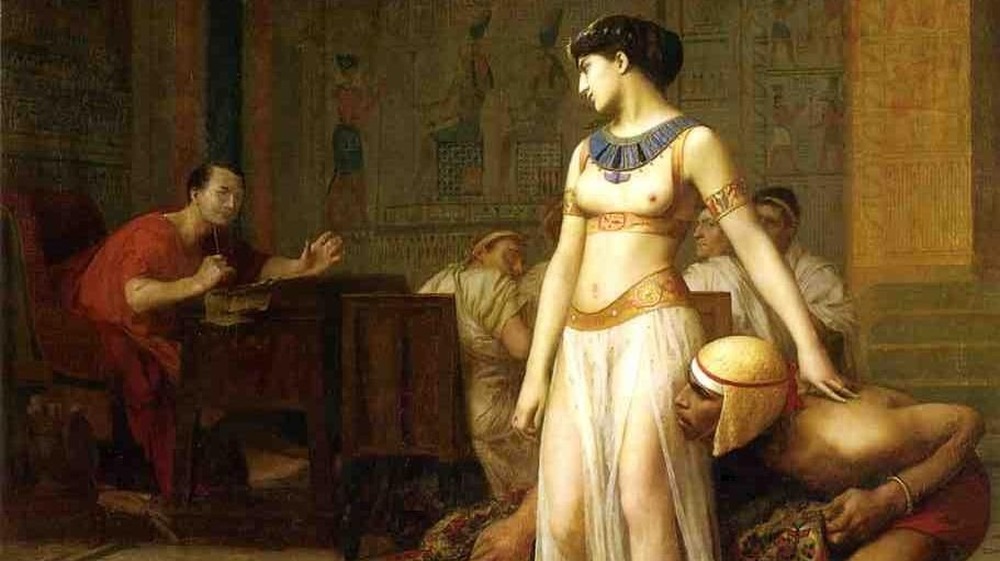Rules Cleopatra's Subjects Had To Follow
Cleopatra was not just the queen of Egypt — she was the pharaoh. This meant so much more to the Egyptians because she was not simply a ruler to them, she was literally considered a goddess on earth. As living gods, all pharaohs demanded much from their subjects, and Cleopatra was no exception. From farmers to merchants and priests, Cleopatra controlled many aspects of her subjects' lives with rules for the products they made, the crops they grew, and in some cases, they were even told who they could marry.
This is not to say that Cleopatra was a bad ruler who abused her power. On the contrary, there were several disastrous times during her reign that Cleopatra's strict rules saved her people from further suffering, including from droughts, famines, and an economic collapse. Yet regardless of Cleopatra's successes, learning how many rules her subjects had to follow makes one really appreciate the freedom of today, like being able to chill on couches and enjoy YouTube documentaries about the fascinating Egyptian queen instead.
The Ptolemies only walked like Egyptians
Today, one of the most misunderstood aspects of Cleopatra's life was that she was not fully Egyptian. As a member of the Ptolemaic family that had ruled over Egypt for 300 years, Cleopatra was Macedonian like her ancestors. This meant that Cleopatra's Egyptian subjects had to not only accept the fact that their pharaoh was from a foreign family but also be alright with the many other Macedonian and Greek people that came with the Ptolemies and, ultimately, filled most of the important positions within the Egyptian government as well.
Yet, Cleopatra and the Ptolemies made it easier for their subjects to accept this by adopting Egyptian traditions, beginning with Alexander the Great before her. The Egyptians' freedom to follow their own religion and ways of life was most important to them, and Alexander understood this when he seized Egypt from the Persians. While the Persians took these freedoms away from the Egyptians after conquering them, Alexander was seen as their savior instead for giving it back to them.
Alexander's successor in Egypt, Ptolemy, continued this practice by assuming all the trappings, ceremonies, and rituals of an Egyptian pharaoh. The Macedonian and Greek newcomers may have ruled over Egypt, but the Egyptians were mostly free to go about their daily life without much change. According to historian Stanley M. Burstein, "despite the influx of Greeks, the Egyptian way of life, legal system, and religious institutions all endured and even flourished in Ptolemaic Egypt," including under Cleopatra's rule.
Cleopatra must be a goddess
Cleopatra's subjects also had to acknowledge her divine status as the Egyptian goddess, Isis, writes Stacy Schiff in her book, Cleopatra. The Ptolemies had identified with Isis for over 250 years, but Cleopatra took that role more literally than any of them before her. To honor Cleopatra as the powerful goddess, her subjects were obligated to provide her with gifts at religious festivals, the most important of which was the feast of Isis celebrated every year. The Egyptians believed that Isis' tears filled the Nile river, a rise that was required for the flooding needed to produce the food that everyone in the kingdom relied upon. So, pleasing the goddess' representative on earth was of utmost importance.
Likewise, the Egyptians were incredibly grateful that Cleopatra carried out the rituals and religious duties of Isis and the pharaoh, because if she did not, they thought the entire world would end. These ceremonial duties were often mundane, yet essential, and included welcoming ambassadors, the appointment of officials, receiving petitions, and greeting subjects.
On the other hand, Cleopatra's Macedonian and Greek subjects living in Egypt had to be fine with their queen acting like the pharaoh and Isis as well. But also like the Egyptians, the foreign elites were free to keep practicing their own Hellenistic traditions, so this probably did not bother them much. Plus, Cleopatra did not abandon her Macedonian heritage and still oversaw the same sacrifices and festivals to the Greek gods that Alexander the Great had years before.
Different classes had different rules
In Cleopatra's Egypt, most were not lucky enough to be full Greek citizens and enjoy the privileges that came with that designation. Although there were certainly exceptions among the priests and government officials, the vast majority of Egyptians were forced to become tenant farmers, growing food for the kingdom. These poor, landless peasants had many rules to follow, and their lives were controlled in several ways. Most Egyptians were forced to borrow the tools they needed and even the seeds to grow crops. In fact, these farmers had so little freedom that they had to get permission to do simple things like breed pigs or even cut down a tree, according to the World History Encyclopedia.
Since the royal language was no longer Egyptian and was replaced by Greek, Egyptians had to learn Greek and become Hellenized, says Britannica, in order to get any government position. But most merchants spoke Greek, so learning the language was vital in several ways.
Greeks faced some restrictions of their own as well, such as they were not allowed to marry non-Greeks. However, Greeks usually benefited more often than not from living in the kingdom ruled by the Ptolemies. In general, Greeks paid less taxes than Egyptians, and citizens of Greek cities like Alexandria benefited even further from lower taxes and being exempt from others entirely. Some Egyptians were allowed to Hellenize, with the best example of this being the powerful priests who were considered Greek for all intents and purposes. But even teachers and actors had exemptions because they were considered Greek professions.
Rules for women during the queen's reign
The combination of Greek and Egyptian cultures in Ptolemaic Egypt created circumstances that were quite unique to women in the ancient world, according to "Women in Egypt." In the more progressive Egyptian culture, all women were legally independent, could own property, and wives could also stand in to do the work or duties of their husbands whenever the latter were unable. On the other hand, it was the complete opposite for Greek women. In most of the Greek world, women had no rights, and a queen ruling over a kingdom on her own, like Cleopatra did, was completely unheard of.
This hybrid of cultures created an interesting scenario where Egyptian women in small villages could have more rights and independence than Greek women, even though they were technically considered lower class. However, since the Ptolemies had ruled Egypt for three centuries by the reign of Cleopatra, both cultures did influence each other over the years. Unfortunately for Egyptian women, their rights had become more limited in Ptolemaic society over time. Yet for Greek women, the change was more positive, as wives were more relied upon by their husbands than anywhere else in the Greek world.
Nearly everything was taxed and labor was often mandatory
Unfortunately, Egyptian farmers had to live under strict rules from the pharaoh. Villages throughout Egypt were told by the government what crops they should plant, and farmers were actually forbidden to leave these villages during harvest seasons. But none of these restrictions compared to the harsh taxes or forced labor many subjects had to endure. Most Egyptians not only had to pay taxes on their land, the food they grew, and the goods they made, but they were also even taxed for their children and slaves. According to the historian Donald L. Wasson, there was a salt tax, a dike tax, a pasture tax, and fishermen even had to give the government 25% of what they caught during Cleopatra's reign. In order to determine the amount of taxes, Egyptians had to comply with government officials who conducted censuses and surveyed fields, orchards, and vineyards.
Even worse than the extensive taxation was the pharaoh's power to summon her subjects whenever she needed workers to farm and harvest crops, which could happen more than once a year. Mandatory labor was also required to maintain the many canals the Ptolemies had constructed in the third century B.C. in order to grow even more crops.
The royal government controlled many industries and factories
Cleopatra's immense wealth did not just come from taxes, because the pharaoh also had many royal monopolies over some of the best products made in Egypt, like beer, oil, linen, and papyrus. If Egyptians wanted to be a part of any of these industries, they had to get used to direct royal intervention from officials and with the government getting most of the profit. Long before her reign, Cleopatra's predecessor, the pharaoh Ptolemy II Philadelphus, made the rules for officials whose job was to oversee the production of these important goods, says Britannica. And the rules persisted all the way up until Cleopatra's day.
Accounts mention several of Cleopatra's prized factories, including a textile mill and a workshop that produced some of her famous perfumes. But even goods that were made outside of Egypt could only be sold in the kingdom under strict rules. The government not only limited the amount of goods that could be imported, but the pharaoh also made sure merchants sold these imports at artificially high prices, writes Stanley M. Burstein.
Merchants were strongly encouraged to trade with other kingdoms
While in power, the Ptolemies made Alexandria into a major trading hub. According to World History Encyclopedia, Egyptian life had been focused primarily on the Nile for centuries, but the Ptolemies had built their new capital city on the coast of the Mediterranean so that they could more easily trade with other Greek kingdoms outside of Egypt. And this shift to focus on the Greek world also made many Egyptians farmers change the type of crops they grew and goods they made.
Egyptians were still free to stick with their traditional goods, and many certainly did so, but more lucrative options were products that the Greeks favored, like wine, olive oil, and wool. Sometimes the royal government encouraged Egyptian landowners to produce these Greek products with more incentives, such as lower taxes for those who started vineyards with their own money.
To entice more farmers to grow the durum wheat preferred by Greeks over the barley and emmer wheat traditionally grown in Egypt, the Ptolemies heavily invested in a massive system of canals since the new crop required much more water. As mentioned before, Egyptians were then often forced to maintain these canals with mandatory labor.
Some Greek customs became normal and even required
Along with drinking wine, using olive oil, and speaking Greek, the reign of the Ptolemies — and Cleopatra — normalized other Greek practices that were new to the Egyptians. The most substantial of these was the creation of the kingdom's first currency. Prior to the Greeks' arrival, nearly all Egyptians still traded goods through a barter system, with wheat as the item most exchanged between people. The World History Encyclopedia says that Ptolemy I changed this when he minted the first widespread Egyptian currency that was based on Greek coins, the drachma, obol, and chalkous. Then in the early third century B.C., the use of all foreign coins became outlawed, even ones from other Greek kingdoms. So, if merchants only had foreign coins and wanted to buy goods in Egypt, they had to exchange these for Egyptian coins at a 1-1 ratio, even if the Egyptian ones were worth less.
Another new idea introduced to the Egyptians by the Greeks was the state auction, which was widespread in use by Cleopatra's day. However, in his book, The Last Pharaohs, J. G. Manning writes that a batch of ancient papyri discovered in 1906, known as the Milon archive, showed how this foreign idea could even be used against the priests, the most powerful Egyptians. When these priests were behind on their tax payments, the official named Milon was ordered to auction off their property to pay what was owed.
Cleopatra pressed her subjects to use her coins
When rising inflation was causing a lot of harm throughout Egypt, Cleopatra created two new coins that her subjects were strongly influenced to use instead of the previous currency. Before she left her kingdom to visit Rome in 46 B.C., the pharaoh decreased the amount of silver by 40% in the main coins of the kingdom, and she minted brand new bronze coins, according to Duane W. Roller in his book, Cleopatra. Cleopatra also did not issue any new gold coins, so her subjects completely stopped using the more valuable currency. Gold coins then disappeared entirely throughout Egypt during her reign.
The most revolutionary change the pharaoh brought to the Egyptians was the introduction of different denominations. Previously, only the weight and the type of metal determined the value of the coin. With this royal decree, Cleopatra's subjects had to look at the markings on coins to figure out how much they were worth from then on.
Extreme conditions led to further royal intervention
Cleopatra already had extraordinary power over the Egyptians, but her control over the lives of her people increased even further when severe droughts devastated the kingdom. Author Stanley M. Burstein says that droughts first caused widespread famine right after Cleopatra became pharaoh in 50 B.C. At the time, Cleopatra knew she was vulnerable as the new queen, so getting the Greeks of Alexandria on her side was more important than anything else. Unfortunately, this meant that she had to throw her Egyptian subjects under the bus. Cleopatra forced all merchants to send the grain from southern Egypt to Alexandria. If any subject disobeyed, she threatened them with death.
However, when the dangerously low Nile River caused famine again seven years later, Cleopatra did not abandon her Egyptian subjects this time around. Stockpiles of food were built up in royal storehouses and then given out to people in need throughout the kingdom. The pharaoh also cracked down hard on any corrupt royal officials and made sure that no one in her government took advantage of the people, especially during that very difficult time.
One more added bonus was that Egyptian merchants were forbidden to sell food supplies to the Romans that had murdered Julius Caesar, Brutus and Cassius. Cleopatra told the Romans that the kingdom simply did not have enough resources, but even if that was untrue, it is highly doubtful the pharaoh would have wanted to help the men who killed her lover in any way.
Cleopatra ordered her men to kill anyone who opposed her
When Cleopatra wanted a rival executed, her subjects were ordered to commit the murder without hesitation, even when the victim was a member of her own family. According to the ancient historians Cassius Dio and Eusebius, the pharaoh not only had the king of Armenia killed but also her own brother, Ptolemy XIV. Cleopatra had already fought a civil war with her other brother, so when the opportunity arose to remove the last major threat to her reign, Ptolemy XIV, she took it. Supposedly, the pharaoh had her men do the evil deed with poison.
The Armenian king, on the other hand, was not nearly as much of a threat but still met a much more brutal end. For betraying her lover, Mark Antony, Cleopatra had her soldiers imprison the rival king, only to have him executed three years later. Afterwards, the pharaoh ordered her men to deliver the head to the Median king. Since the two kings were enemies, Cleopatra hoped the barbaric act would convince the Median king to ally with her, but he rejected her offer.
All Egyptians had to submit to the Ptolemies and also to the Romans
Arguably the worst insult the Egyptians had to endure during Cleopatra's reign was that they were ruled by a family from a foreign land ... who then had to obey the foreign Romans. But, according to author Stacy Schiff, the pharaoh's alliances with Julius Caesar and Mark Antony were completely necessary at a time when the Romans dominated all of the Mediterranean, except for Egypt. If Cleopatra and her subjects wanted to avoid conquest as well, they had to please the generals of the growing empire.
Even worse for the Egyptians was that all of Cleopatra's children were fathered by the two Roman generals, meaning that all her heirs would be Roman as well. The Romans were there to stay, and the Egyptians just had to deal with it. For the most part, this simply meant that the Egyptians had to provide housing and feed thousands of soldiers whenever they were stationed in the kingdom, or they had to ship grain to Italy or wherever the Romans needed it. Of course, Roman control became absolute after Cleopatra and Mark Antony were defeated. Egypt then became a Roman province and had to live by their rules instead.
